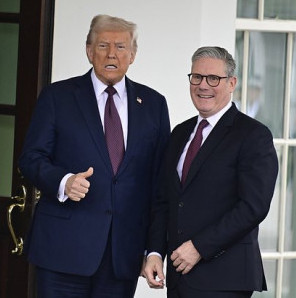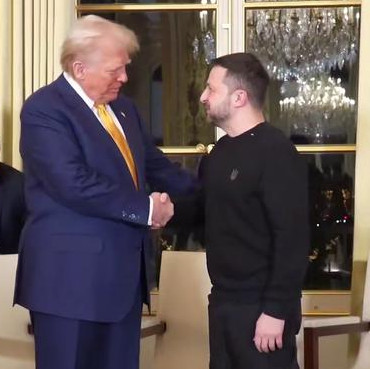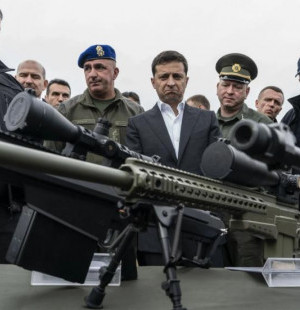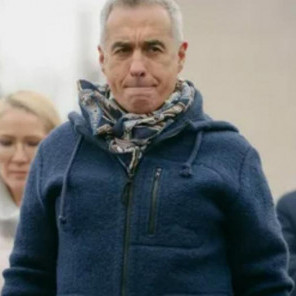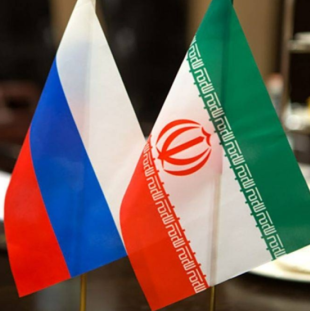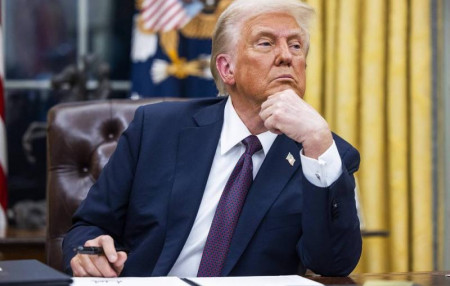
Moscow maintains an energy ceasefire, unlike Kiev, which considers extending talks on a minerals deal with Washington. Meanwhile, US President Donald Trump mulls drastic cuts to the State Department budget. These stories topped Wednesday's newspaper headlines in Russia, according to TASS News Agency.
Izvestia: Whether Moscow would extend energy ceasefire
Since March 18, when a 30-day energy ceasefire was implemented for Ukraine and Russia, Kiev has breached the agreement over 107 times. Daily attacks using drones and HIMARS rockets as well as artillery shelling have become the routine, despite Kiev’s pledges. While Russia has consistently adhered to the ceasefire, "this temporary moratorium has not been and is not being observed by the Ukrainian armed forces," Kremlin Spokesman Dmitry Peskov emphasized.
And Ukrainian troops have been regularly making attempts to target energy facilities on Russian soil, including those associated with energy transmission to Europe and Kazakhstan. "The enemy has used unmanned aerial vehicles that can cover a distance of hundreds of kilometers. It has used HIMARS, too, to a lesser extent, though," military expert Vasily Dandykin explained to Izvestia. According to him, even as Ukrainian attacks have caused disruptions locally, the Russian energy system was not crippled thanks to efficient air defenses.
Tigran Meloyan, an analyst with the Center for Mediterranean Studies at the Higher School of Economics, does not see enough justification for prolonging the energy ceasefire, except as a symbolic gesture. "It was clear from the very beginning that the Ukrainian side cannot be trusted to honor the ‘partial ceasefire.’ And it is Kiev’s inability to negotiate that Moscow needed to demonstrate to [US President] Donald Trump. Russia has had such an opportunity, and it can present a convincing amount of evidence now," Meloyan told Izvestia.
Among other things, Moscow and Washington outlined the energy ceasefire for Russia and Ukraine in the context of discussing reviving the Black Sea initiative. And ceasefire infractions by Kiev may undermine the prospects of restoring the grain deal amid a lack of confidence in its compliance. Meanwhile, Ankara, which facilitated the grain deal in 2022, is hosting a two-day Black Sea security meeting without Moscow’s participation.
According to Ukrainian Deputy Prime Minister for European and Euro-Atlantic Integration Olga Stefanishina, Kiev has submitted its proposals regarding a potential resources pact to its US counterparts as it expects the talks to continue until the two sides finalize agreement. Meanwhile, media reports described the atmosphere at the talks as strained and said that Washington is preparing to impose sanctions on the team of Ukraine’s Vladimir Zelensky.
Even as statements from US Treasury Secretary Scott Bessent indicated that a minerals deal could be signed soon (with the deadline repeatedly shifting), Washington clearly rejects the idea of extending the negotiations indefinitely, with Western media reports saying the United States has toughened its stance on Ukraine.
Ukrainian lawmaker Yaroslav Zheleznyak reported on social media that Washington is weighing sanctions against the Zelensky team to pressure him to sign the deal. Two black lists have been drafted, one targeting the head of Zelensky's office, Andrey Yermak, and 16 other high-profile Ukrainian officials, and the other potentially affecting almost all Ukrainian ministers and Zelensky’s colleagues in Kvartal 95 Studio.
Former Ukrainian MP Vladimir Oleinik said in a comment for Nezavisimaya Gazeta that Kiev had previously agreed to cede strategic Ukrainian natural resources to European businesses, mostly companies in Britain where Zelensky evidently hopes to spend his life later with his family. Apparently, the idea was to transfer the sought-after minerals during a lengthy period of time during which the current government would remain in power.
"Here is when US President Donald Trump moved to capitalize on his own political victory and demanded that Kiev reimburse all the aid provided by Washington by signing the necessary papers. This ruled out any quiet allocation of natural resources and complicated their registration. Besides, Trump showed quite considerable ambitions, which is why Zelensky chose to delay the negotiating process," Oleinik explained. In these circumstances, the Kiev regime could perhaps expect that Washington will soon have no time for Ukrainian resources amid the tariff war, but the US does not seem to be backing off.
Vedomosti: Trump mulls drastic State Department cuts
In the 2026 fiscal year, the US may cut allocations for the Department of State by 48%, reducing it to $28.4 billion from this year’s budget of $54.4 billion, The Washington Post reported, citing sources. Humanitarian aid programs and healthcare initiatives may see reductions of 54% and 55%, respectively. Also, funding for international peacekeeping operations could be entirely suspended, with roughly 90% of funding for international organizations to be removed. "Funding for the United Nations, NATO and 20 other organizations would be terminated," an internal memo reviewed by the newspaper reads.
Foreign military funding (FMF) for such US allies as Israel and Egypt will remain unchanged. The International Atomic Energy Agency (IAEA) and the International Civil Aviation Authority (ICAA), too, may continue to receive US contributions, among other global organizations. The document also proposes a dedicated $2.1 billion contingency fund. According to the WaPo, even as the latest proposals were submitted to the Department of State last week, "no conclusive funding decisions have been made."
The proposed funding cuts will not affect major strategic issues, Vladimir Pavlov, deputy dean of the international relations department at MGIMO University, explained. According to him the ICAA is important in terms of both domestic and foreign flights and the promotion of standards that benefit the United States. However, the scale of proposed cuts is without precedent, the expert told Nezavisimaya Gazeta. If the US takes consistent steps, the slashed funding and personnel cuts could enhance the effectiveness of American diplomacy and the training of American diplomats, even as achieving that will not be easy, Pavlov maintained.
Besides, it will not be possible to implement the cuts at such a large US agency as the Department of State without approval from the US Congress, Director of the Center for North American Studies at the Institute of World Economy and International Relations Victoria Zhuravleva noted. Getting the backing even from Trump’s Republican allies will be a challenging task, and much will depend on how the US economy fares by next fall, when the federal budget will be reassessed, she explained.
Kommersant: Global wealth managers pessimistic about Trump’s economic trajectory
The global economy is teetering on the brink of a recession because of the US president’s trade stance, according to the majority of portfolio managers surveyed by the Bank of America. They have been offloading stocks, mostly US ones, while increasing the share of cash as well as defensive assets, such as gold and short government bonds in their portfolios. Against this setting, investors see increased risks of moving away from the widespread use of the USD.
The number of respondents who anticipate slower global growth in the next 12 months exceeded the share of those expecting higher growth rates by a margin of 82%. BofA has never recorded such investor pessimism in the 30-year history of its surveys.
"The Trump administration’s surge in tariffs that shocked the markets significantly increased uncertainty and cast doubt over the predictability of the rules of the game that had long benefited those buying US assets," portfolio manager at Doveritelnaya brokerage Dmitry Terpelov told Kommersant.
Fund managers naturally opt for gold, short government bonds, and other safe assets "that are less vulnerable to price fluctuations during interest rate adjustments by central banks," senior portfolio manager at Renaissance Capital Ilya Golubov said.
Even as the Russian stock market remains vulnerable to external shocks because of its dependence on energy prices, stable growth drivers are emerging here, including the ruble strengthening that may reduce inflation risks and strengthen hopes that the Bank of Russia would adopt a more accommodative monetary policy, Ruslan Klyshko at AF-Capital explained.
Nezavisimaya Gazeta: Ruble strengthens to USD by almost 30% in 2025
Since late last year, Russia has undergone sweeping changes in its financial policy, with the key interest rate holding steady, the ruble moving from a weakened position to rising sharply, and officials speaking of easing inflation. On Tuesday, the ruble continued to gain ground against the US currency, with the USD slipping to 81.7 rubles per $1.
Many analysts anticipate the ruble will keep climbing in the coming days. "Optimistic sentiments and hopes for a productive dialogue between the United States and its trade partners dominate global markets, with Russian investors looking for additional signs of thawing Russia-US ties, so the ruble could continue its gradual rise," Head of Economics and Sector Research at Promsvyazbank Yevgeny Loktyukhov told Nezavisimaya Gazeta.
So far, the ruble has appreciated amid ongoing discussions between Russia and the United States, experts highlight. "The notable ruble rally began in mid-February, after the US and Russian presidents spoke by phone. So, improved geopolitical dynamics have likely supported the ruble," senior analyst at Pervaya brokerage Natalya Vashchelyuk explains.
With the ruble rallying even as oil prices decline, Russia may face challenges in the months ahead. "Oil prices have dropped in April, with Brent hitting $59 per barrel, marking a four-year low. Weaker oil prices might impact the ruble closer to summer," warns Alexander Potavin, an analyst at Finam.
TASS is not responsible for the material quoted in these press reviews

